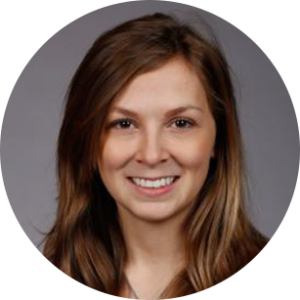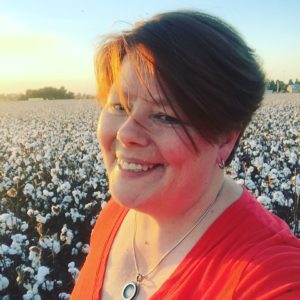Janice Person:
Welcome to Ag Over Easy the podcast from Channel where you get breakfast with a side of agronomic insight. I'm your host Janice Person, and today we're having ham and eggs and a look inside the world of an agronomist. We'll cover a lot of ground and get into the weeds with Meaghan Anderson, a field agronomist from Iowa State University Extension and Outreach. Meaghan provides education and programming for all things field crop-related, but she's especially passionate about Weed Science. Before our plate gets cold, some helpful tips from our agronomist friend. Meaghan, thanks so much for being here.
Meaghan Anderson:
Thanks for having me.
Janice Person:
I gotta ask you, since we're talking breakfast, ham and eggs, how do you like your breakfast?
Meaghan Anderson:
So it's, I dunno, it's funny. I'm not a huge breakfast person, but I love big weekend breakfast, right. I am huge into making breakfast for my daughter and my husband. And it just brings back these fabulous memories of when I was a kid, and we lived really close to my grandparents and so on Saturdays we would go up and my grandpa would just make, I mean, just huge elaborate breakfast, right. He would tap maple trees and make his own maple syrup.
Janice Person:
Oh, Wow.
Meaghan Anderson:
So we had pancakes and eggs. And sausage and stuff. So, breakfast is fantastic and I love big country style breakfast with everything.
Janice Person:
It sounds like your grandpa was a great guy. Is your family an agricultural family?
Meaghan Anderson:
Yeah, yep, so my grandpa and my dad and now one of my older brothers have farmed basically all their lives. So I have a lot of really good memories of growing up on the farm. I had four brothers, so I wasn't super involved with the farming though I did walk a bean field now and then when I was kid and helped move equipment around. But it's a really nice to have come kind of like full circle that I went to college and sort of found myself back in agriculture and now I get to help not only my family, but I get to help other farmers too.
Janice Person:
Yeah, and tell me how that works. You're with Iowa State with the extension service, so how does that kind of connection with farmers and people like your parents and your brother work?
Meaghan Anderson:
Yeah, so I'm one of 11 field agronomists across the state, so we are a team of specialists that focus on row crops and then hay and pasture. And we're basically available as kind of an independent agronomist resource to provide research-based information to farmers across the state. So we each kind of cover our own geography. I happen to be in central Iowa, and we're just here as that kind of third-party opinion. We can do a little bit of research, we do a lot of like field days and other types of programs for farmers, private pesticide applicator training. But definitely my favorite interactions are when somebody calls me up and asks me, like a random question or they want more information on something to kind of see what the research is out there and we can help. Kind of on that one-on-one basis.
Janice Person:
Yeah, I like to think of agronomists as really good on breadth. I mean, each one can have depth in an area but there's a breadth of information across agriculture that isn't always common in some of the roles. Some of us get to be specialists pretty quickly.
Meaghan Anderson:
Yeah, that's probably the most fun thing is that I'm not an expert in many areas, I know a little bit about a lot, but I know people who are experts in different areas. So somebody calls me and I don't know the answer that's probably one of the most important things as an agronomist is to be able to say, "Yeah, that's a really fabulous question. "I don't have that knowledge base "to be able to give you an answer right now, "but I'm going to research it. "I know some people who know, right? "It's not what you know it's who you know, "and I'm gonna get back to you on that." And that's probably, I mean, the best skill set that anybody could possibly have is to be willing to admit when they don't know and be able to find the resource that's gonna be useful.
Janice Person:
Right, right. Well, you're telling us a lot of different parts of your job. So what's a day in the life of Meaghan look like?
Meaghan Anderson:
Well, I think, I mean this week is probably a pretty good example of an extreme day-to-day difference. So like Monday I spent almost my entire day in meetings on Zoom now that we're in this kind of COVID era. And then yesterday I drove down and helped pick out some corn stalks that have a disease so that I could take them up to a pathologist and we can confirm that it was anthracnose. And then I spent most of the rest of my day wading through corn fields, picking ear samples to check for ear molds, because that's just what you do this time of year and pushing corn stalks over. And then this afternoon, I'm gonna go out and do more of that, and I'll collect some waterhemp samples to get them tested for herbicide resistance. And I guess spend a lot of time outside, but just wildly different from day to day. One day I'm wearing dress pants the next day I'm wearing jeans and work boots out in the field.
Janice Person:
So you've mentioned that connecting with people is part of what you love. How are you doing that on Twitter? I see that you're out there a good bit.
Meaghan Anderson:
I definitely think I do use it to try and connect with people because it's a really neat opportunity to show maybe not so much a different side of myself because social media is kind of something that's pretty typical for people my age, but a neat way to use social media to get information out in a succinct way and to use photos and videos and make things palatable for people to understand, right. Because you have to be short and you have to be to the point on social media.
Janice Person:
Right, if you could say this is the ideal way for me to work with farmers or what they ought to know about the work you do so they can find the right people to help them out. What's that look like?
Meaghan Anderson:
Every conversation that I go into with someone I try to keep my own personal opinions out of things for my own personal experiences as much as possible, unless I've either had a lot of experience in something or I've got a research base to back it up. So it's kind of fun from my perspective to be able to start fresh in every conversation and kind of look at things and say, "Okay, well, what does the research say about this?" And so from my perspective it's helpful if a farmer comes to me and asks me something about a chemical program. They need to know that a good agronomist is going to have about a thousand questions back.
Janice Person:
Oh, yeah.
Meaghan Anderson:
Starting with what does your operation look like? What's the history of what you've been doing? What's your personal preference? What's your labor requirements? And so, having that relationship where you can kind of back those things back and forth and really be willing to... As an agronomist I wanna invest in conversations and I wanna invest in someone's operation and make sure that I know enough to be able to give them good information. And I would hope that a farmer is willing to invest the time back to give me the information that I need for this to be a mutually beneficial relationship.
Janice Person:
Tell me how your passion for Weed Science shows up on your job?
Meaghan Anderson:
Well, I mean, it started a long time ago that weeds have fascinated me, because I tell people all the time weeds always win. It seems like no matter what we do they're constantly outsmarting us, which is really unfortunate. Every May there are going to be weeds out in your field. It doesn't really matter what you do there are going to be weeds there, and we always have to deal with them. So I think it's a really useful knowledge base to have especially as weed management has gotten so much more challenging in the last decade or so.
Janice Person:
Right, can you tell me how the 2020 year is shaping up in your area?
Meaghan Anderson:
The 2020 year, it has been a weird one, right? I mean, I probably said that every year for the last four years that things have been weird. We worried a little bit about pre-herbicides with corn because we were so dry, but some people I talked with they would say "Well, we knew we were gonna pay for this later." And I think we definitely paid for it later, because we had a fantastic spring and then right after Memorial Day for a lot of my area the rainfall just quit. And the far eastern part of my area kept getting rain, they got quite a bit more rain, but kind of the western part did not get very much rain at all. We were actually pretty drought, we were probably in drought shortly after the 4th of July or right around the 4th of July. And it just continued, crops looked pretty good for the most part still except in the far western reaches of my area. And then we got rain in August and unfortunately we didn't get very much rain but we got way more wind.
Janice Person:
All at once.
Meaghan Anderson:
And so that, all at once in 45 minutes. I mean, I don't know what percent of the corn in central Iowa ended up flat on the ground but it was a huge percentage of it with that derecho that came through on August 10th. So it's been just a really especially strange year weather-wise. And I mean I think we deal with some of these weird weather things every year. But the combination of the drought and then following that right up with the derecho and still being in a drought.
Janice Person:
Yeah.
Meaghan Anderson:
It takes the cake. That's a new one.
Janice Person:
Yeah.
Meaghan Anderson:
I hope I never see it again.
Janice Person:
Right, well, I understand that you're helping others understand what happened in derecho. So somebody says that you actually had the opportunity to tour the area and provide some information with the Secretary of Ag, Sonny, came to visit.
Meaghan Anderson:
Yeah, I did do that. So I actually, I had two opportunities to go up in the air. So the first one I went up in a small six-seater plane with the Secretary of Ag for Iowa, Mike Naig. And we were able to tour a really wide swath of the area, we basically went from central Iowa all the way over to Cedar Rapids and sort of made a loop back over. And then a couple of weeks later I was able to go up and do a similar thing where I kind of provided some commentary and answered questions with Secretary of Agriculture Sonny Perdue. Our governor was with us, Senator Joni Ernst was with secretary Mike Naig of Iowa. So that was incredible to be able to have that opportunity to go up with them and share some of the challenges that we've been facing and some of what we expect to see out of the crop and what we expected for the rest of the fall.
Janice Person:
Right, that bird's eye view really changes the view of what your crop looks like, right?
Meaghan Anderson:
Yeah, absolutely. And one of the big things that we've been dealing with this fall is that a lot of these fields have been, people have been trying to harvest them, and we just don't know where some of this debris is in some of these fields. So I heard earlier this week that somebody actually picked up basically like a road closed sign with their combine, couldn't even see it cause it was underneath the crops. So that bird's eye view, if we have the ability to do that and can kind of help protect people.
Janice Person:
Yeah.
Meaghan Anderson:
And see where some of this stuff is so that we can minimize the amount of further damage that happens, right.
Janice Person:
Right.
Meaghan Anderson:
Just amazing.
Janice Person:
I hadn't thought about that, but things like drones could really come in handy as you not only survey the damage but also as you look for hazards because you're gonna be going back in there whether it's with a combine or prepping for next year, right?
Meaghan Anderson:
Yeah.
Janice Person:
So kind of making sure you're staying safe in an environment like that, a bird's eye view might help.
Meaghan Anderson:
Yeah, we talk a lot about the value that UAVs or drones can provide on the farm and trying to make sure that they're not just some fun toy that we have.
Janice Person:
Right.
Meaghan Anderson:
Cause they're a pretty cool toy, but we wanna make sure that if we're gonna have them and we're gonna put the time and effort into using them that we can get some value out of them. And that's a huge opportunity to get value in any year and even more important in a case like this where we can maybe survey some damage ahead of time. You can get some images, you can see where there might be debris that could be hazardous to the combine or any other equipment. Just amazing tools that we have at our fingertips in a lot of cases to be able to look at this.
Janice Person:
Right, as I look at what was available for women when I was growing up and stuff, there were some women in roles like yours in agronomy but there wasn't a really clear path for a lot of women to do it. Looking at your daughter and thinking about what path she could take how would you kind of give somebody advice? Maybe not quite as young as your daughter but somebody who's thinking, I would really be interested in considering extension or maybe I would like to go into a research area, what would you tell them?
Meaghan Anderson:
The sky is the limit. I mean, what's amazing to me is that we hear a lot about like women in agriculture and we are kind of this like special cool group I jokingly tell people that like, "Well, I got into agriculture "because it's like a football game. "The lines for the women's restroom "are always short at meetings and stuff." But it doesn't matter what you intend to do in life but it's kind of, the sky's the limit. It's what you make of it. If you wanna go be in agriculture, and even if you've never had any experience, you kind of gotta jump in with both feet.
Janice Person:
All right, with those inspiring words I think this is a perfect place to wrap up this episode of Ag Over Easy. Meaghan, we really appreciate you joining us today.
Meaghan Anderson:
Yeah, cool, I appreciate you having me this has been a lot of fun. I hope it was as useful to you and listeners as it was to me, it was a good time.
Janice Person:
I feel like Meaghan's insights as an agronomist can be applied to other parts of life. She says one of the best things an agronomists can do is admit when they don't know an answer but they can find someone who does. And to give the best advice, you need to invest in conversations so you can judge every situation accurately. Finally, looking at things from a bird's eye view can reveal hidden hazards and help navigate your field - and life - more smoothly. That's it for this episode of Ag Over Easy, the Channel podcast where you get breakfast served with a side of agronomic insight. Be sure to subscribe to Ag Over Easy wherever you listen to podcasts or at agovereasy.com.




